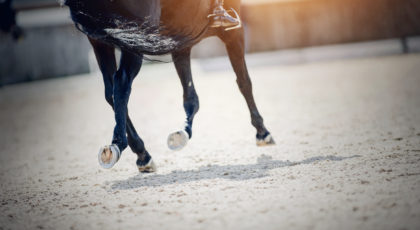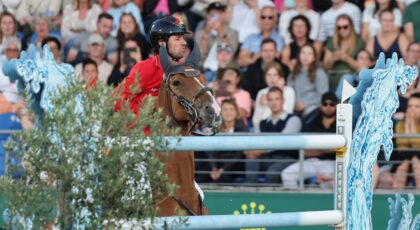What makes a good horse great?
An elite level of natural-born athletic talent, to be sure. A knowledgeable program and partner with whom he or she can learn, grow, and receive the best of care.
But when it comes to a show jumper like King Edward—a horse who, by the numbers, is better than any other equine athlete in the last 25 years—there is the open question of still something more.
Maybe it’s his keen intelligence and understanding of the task at hand. Maybe it’s that notorious sensitivity, or his working-dog-like drive to succeed at a task he was bred to do (not unlike a border collie tending his flock of sheep).
Whatever the source of the magic, that lightning in a bottle, it’s something that World #1 Henrik von Eckermann of Sweden is glad to have found, and is likely even more eager to hold onto.
And with good reason.
Over the course of his four years under von Eckermann’s saddle, King Edward has achieved more than any other horse on the world stage: winning more than $4.3 million dollars and climbing 43 podiums, nearly half of those as wins. Of those 22 victories, all but one have been at the 1.60m level and above.
League of His Own
So just how effective is King Edward at the championship, 1.60m height? Unparalleled, in a word.
Because, by the numbers, the gelding has pulled off a full Secretariat-in-the-Belmont: he’s virtually left the rest of the field in the dust to become the highest earning horse of the last quarter century—and by a wide margin, according to Jumpr Stats.
McLain Ward’s legendary partner HH Azur is a close second ($4.17 million), but finishes more than $100,000 shy of King Edward’s current total. What’s more: HH Azur’s career spanned three years longer than the gelding’s current age of 14. (Related aside: she won the CSI5* Rolex Grands Prix of ‘s-Hertogenbosch and Geneva in 2022 at age 17!).
Also part of the elite $3 million-dollar 1.60m+ club? Kent Farrington’s (USA) Gazelle (around $3.8 million) and Ben Maher’s (GBR) Explosion W (just under $3.2 million), both of whom are now retired.

In fact, of the top-10 earners at the championship height over the last quarter-century, only three horses, according to age, can be considered serious contenders to catch King Edward.
Two of these include his contemporaries, the 14-year-old Killer Queen Vdm under Daniel Deusser (GER), and the 15-year-old Monaco N.O.P. under Harrie Smolders (NED). Yet both are currently more than $1 million shy of King Edward in earnings, making overtaking his legacy, at this stage, an unlikely scenario.
Slightly more promising: Martin Fuchs’ Leone Jei, a horse that’s batting a thousand in his own right and is two years King Edward’s junior. At age 12, he’s amassed just under $3 million in prize money and earned 12 wins—giving him the edge on King Edward who, at the same age, had earned just over $1.2 million and had six wins to his name under von Eckermann.
But things change dramatically when you compare their stats.
During his 12-year-old season, King Edward jumped 34 rounds at 1.60 and higher, where he was clear at 70% (1.60m) and 86% (1.65m); he averaged less than a single rail at both heights. The gelding also finished in the top-5% at 54% (1.60m) and 86% (1.65m), respectively.
Compare that to Leone Jei who, at 12, has jumped considerably more rounds at those heights (72). But his numbers are significantly lower by these measures: he’s clear at 51% (1.60m) and 43% (1.65m), and drops an average of 2.15 faults. Similarly, he finishes in the top-5% at 43% (1.60m) and 25% (1.65m).
Not shabby, by any stretch, but still not good enough to unseat the King.
Although King Edward has now logged more than 80 rounds at the top heights with von Eckermann to date, he’s maintained his unprecedented accuracy, dropping an average of just 1.05 faults at 1.60m and higher. Two years later, he still finishes in the top-5% at 62% at 1.60m, and a whopping 83% of the time at 1.65m—and he’s not done yet.
By most standards, only individual Olympic gold still eludes von Eckermann and King Edward at this point, and you can bet they’ll be looking to remedy that problem in Paris this summer. That medal would be a glittering, final jewel for an already legendary crown.
Fit for a king, indeed.


 May 17, 2024
May 17, 2024 

























